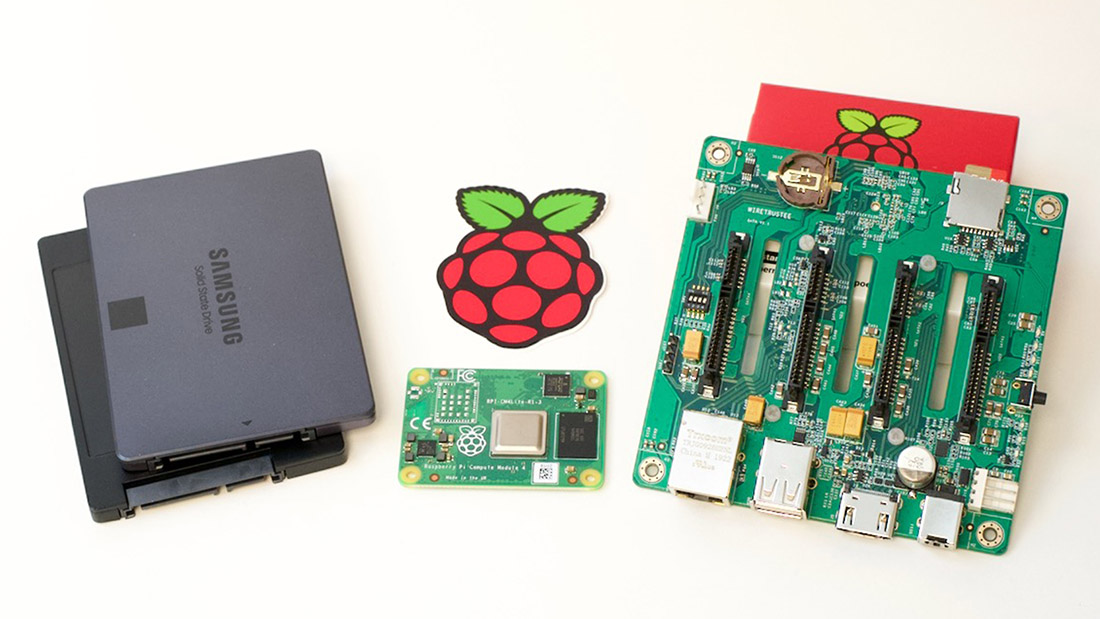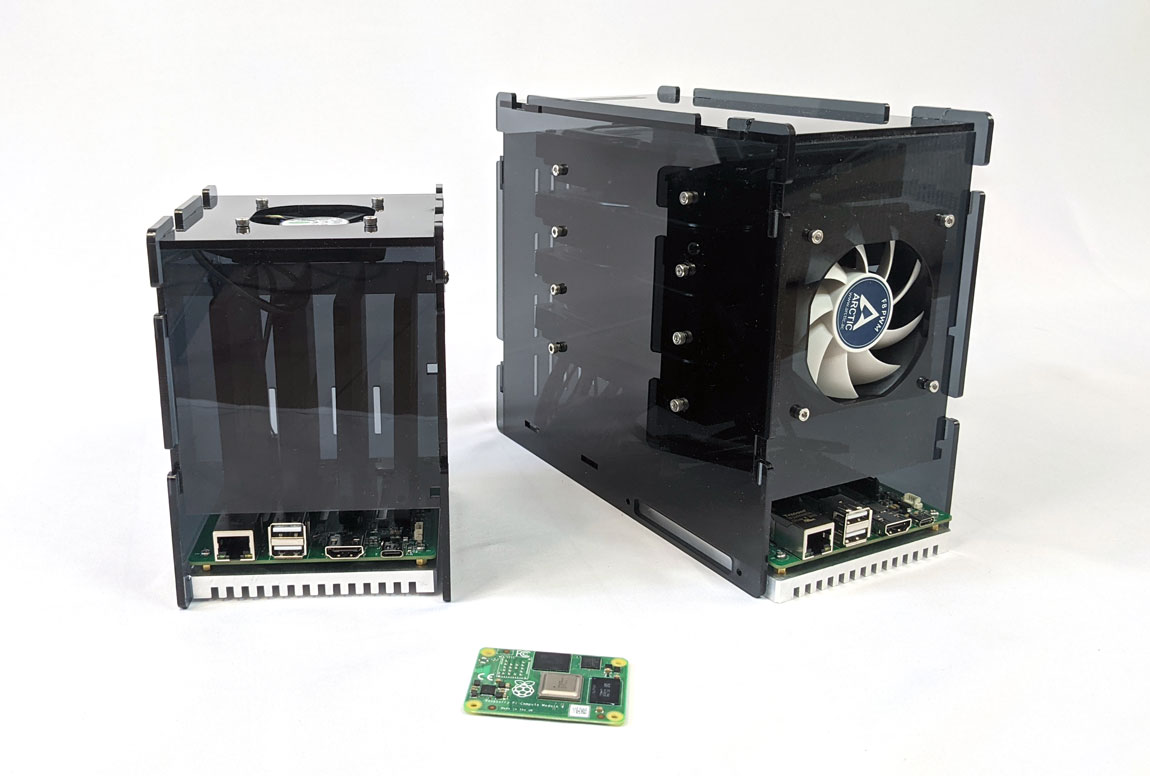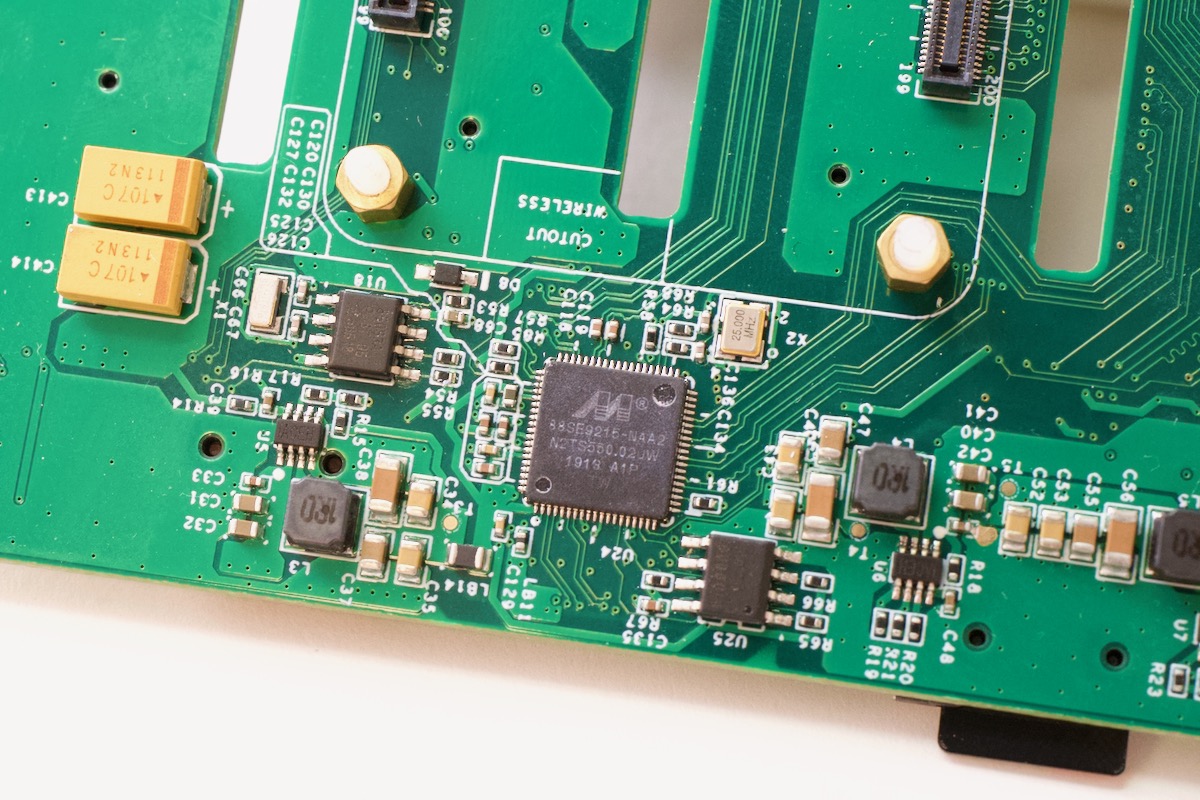In my earlier posts about building a custom Raspberry Pi SATA NAS, and supercharging it with 2.5G networking and OMV, I noted that my builds were experimental only—they were a mess of cables and parts, with a hilariously-oversized 700W PC power supply.
I lamented the fact there was no simple "SATA backplane on a board" for the Raspberry Pi Compute Module 4. But no longer.

Wiretrustee's SATA Board integrates a SATA controller and data and power for up to four SATA drives with a Raspberry Pi Compute Module 4.
And their entire solution makes for a great little Raspberry Pi-based NAS, using software like OpenMediaVault.

You can get a 2.5" or 3.5" kit—in the video below I set up the 3.5" version—and you plug in four SSDs or Hard Drives, and (for now) recompile the Pi OS kernel to include AHCI support, then you have one of the most compact and convenient NAS builds available.
I haven't done formal benchmarks on this setup, but could easily saturate a gigabit network connection with over 115 MB/sec reads and writes depending on the disk speed and workload. The Pi is well-suited to the task, and the internal PCI x1 Gen 2.0 lane can handle internal throughput of around 400 MiB/sec.

Check out the video above for more details about the hardware and their custom case, and also check out my database of CM4-based boards and projects for more inspiration—there are some other great new products I'm seeing like these two Pi blade servers, and two unique Pi 3D Printer control boards!
Comments
The day I finished editing the video for the Wiretrustee SATA, the folks behind the board announced they were postponing production because of the component shortage—some parts, most notably the SATA controller chip, had increased in price dramatically, and would only be available in small quantities.
You can still sign up for updates on the Wiretrustee SATA Board's Crowd Supply page, and I'm still hopeful this product ships, since it's the simplest and most compact SATA NAS board I've seen for the Pi.
Hey Jeff - I always enjoy your posts, but isn’t the Pi woefully underpowered to be a nas? It doesn’t do sata natively, but over usb (high latency). The usb ports it has it shares a bus with ethernet. Also, pcie 2 at 400 MiB is best case scenario spec. Sharing that bus with ethernet and more than 1 spinning rust disk seems like a bottleneck.
Look again—this particular NAS uses SATA directly over the Compute Module 4's PCI Express bus.
So it's native SATA, and allows for RAID and applications like Open Media Vault to make use of software RAID volumes. It's definitely not going to compete against SMB-focused NASes, but it will saturate a 1 Gbps network link pretty well and could be a great starter NAS or secondary replica NAS too.
I am able to easily get 400 MiB/sec sustained through the Pi Compute Module 4 in this scenario, though the biggest constraint on the NAS side is the 1 Gbps network port.
Finally, on the Compute Module 4 (and the Pi 4 model B even), the network NIC chip is actually separate from USB entirely, so there's no real performance hit using both at the same time.
Wish they could incorporate the power brick or small supply. Cabling always turns into a mess. The DIY enclosure is interesting, could make a larger version with supply and POE switch, just plug in other SBCs to access power, network & data.
I will never take the risk to save critical data on a similar system.
Maybe you can call it NAS but in reality is just a nice proof of concept
So you are saying that it is not a real NAS...
First off, this kind of thing is exactly what this blog is about. Secondly, the parts that Jeff is using are not that different at all from what a commercial NAS is made of. Not only that, but in some ways the Raspberry Pi has the potential to beat the commercial offerings in terms of efficiency, but that is up for testing. But in terms of reliability, if one was to use this system to store critical data, not only would it be run on UPS, but the drives would be formatted for redundancy to prevent data loss. All in all, there isn't much to set it apart from a mid-range commercially available NAS - except for the fun factor :)
totally agree. If you open a Synology NAS casing you will be shocked how basic and cheap the components are. A $350 Synology is by far inferior to a RPI4 NAS as described above.
I have a Western Digital ShareSpace. Apple no longer supports SMB1 and WD no longer support the ShareSpace, so there is no upgrade to SMB3. I can see the attraction of having complete control of your own device and the software it runs.
Different OEM same problem! There is the appeal of DIY.
Hi Jeff,
I've been looking at some other non-Raspberry Pi based boards for NAS use, mainly because Pi doesn't support AES in hardware like most of its competitors do, making cryptsetup/luks disk encryption painful. I consider that a must for a NAS, because sooner or later you'll end up with some private data on it by accident. But I just learned about Adiantum today, which is a block cipher project using encryption algorithms similar to wireguard and backed by Google for use in low end phone hardware.
Now, I'm really curious about how it compares in performance. Could an encrypted Pi NAS saturate 1 Gbps? Can it saturate that much if being used as a btrfs raid1 (encrypt/decrypt twice for two devices, and then checksum data on fs level).
The overhead for the CPU encryption would likely cause a significant impact in copy speeds over the network, even for 1 Gbps... though it's something I should test out at some point (I haven't yet on any of the Pi NAS solutions I've tested).
I'd love to know if this could handle the CPU overhead of a torrent box that's via a VPN and still maintain good download speeds (gigabit)
thanks
I cant wait for it!!!!
It would be interesting to see other non-PI NAS DIY solutions. It might be worth investing some money in a NAS solution between 100-200 if one could use different CPUs or memory.
I would think under 200 would be hard from scratch but not if you have and used computer parts like case or power supply. I think Jeff has shown the pi capable. If you want more performance you need at least 2.5 Gb NICs then depending on budget storage requirements SSDs.
Jeff -
Got an email from them today saying due to supply issues, they are effectively "cancelling" the cm4 sata board. :-(
Thanks for posting the update; looks like we'll have to set our sights on the Radxa Taco for the foreseeable future, then!
Or build from off-the-shelf components.
I'm building a 2-drive hardware RAID NAS using a CM4 with 4GB RAM, IO Board, 2-port SATA RAID controller and re-/up-cycled Shuttle XPC SN95/SB77 case and PSU. The new components cost was about 150-170€ plus disc drives.
I'll publish details shortly on OpenMediaVault's forum section "My NAS Build"
Seeking for this setup. Specialy for the rasberry server cage. Any link where to buy this cage? Thanks .
Hi Jeff,
did you hear anything new of this Project? I am waiting now since your review that this Project is going on but still hear nothing from them.
Thanks for the nice content you produce which is always an pleasure to see.